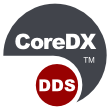New Release of CoreDX DDS: v3.5
March 5, 2013 Twin Oaks Computing is proud to announce the availability of the newest CoreDX DDS release: CoreDX DDS v3.5. This release provides a standards-based, interoperable publish-subscribe middleware with all the features of the Data Distribution Service Standard and minimal resource requirements. CoreDX DDS v3.5 delivers wider platform support, greater API coverage, increased performance and scalability, all within our existing small footprint.
New Platform Support: We continually add support for new platforms to the CoreDX DDS product line. CoreDX DDS v3.5 now features support for Windows Embedded CE and Windows Embedded 7 and DSP’s. CoreDX DDS brings your networked devices to market faster by allowing developers to re-use their code and program against a common communications API across all components: from deeply embedded devices like FPGA’s and DSP’s to desktop and server computers.
Learn more about CoreDX DDS Platform Support
New Safety Critical Edition: CoreDX DDS v3.5 was the basis for our new CoreDX DDS-SE product line. CoreDX DDS-SE Currently supports INTEGRITY-178b and LynxOS-SE. Look for additional ports in the coming months.
Learn more about CoreDX DDS-SE
More Performance Optimizations: CoreDX DDS has further improved its throughput and latency performance, especially on challenged devices like Android, FPGA’s and DSP’s. In addition, we have further optimized the Reliability protocol and Query Conditions. CoreDX DDS still packs performance with latencies measured in the 50 usec range and throughput exceeding 900 Mbps.
Learn more about CoreDX DDS Network Performance
Transfer data of any size with CoreDX DDS: CoreDX DDS now supports sending and receiving of very large messages. This is accomplished with the interoperable DATAFRAG (DDS data fragmentation) protocol. Messages can be fragmented before sending on the wire and re-assembled on the receiving end. CoreDX DDS data fragmentation is highly configurable, to maximize network performance in any environment.
New TCP Transports: CoreDX DDS has added new transport options: TCP and DSP. The TCP transport extends the reach of DDS communications across the Internet, and other environments that may contain network blockers like Firewalls and NATs. CoreDX DDS users can now select from our expanded list of transports: UDP, TCP, serial, backplane (VME, cPCI), RDMA, and a DSP Link, which provide a flexible, memory based transport between a GPP and an FPGA.
New Dynamic Discovery Options: CoreDX DDS continues to make enhancements to the automatic and dynamic discovery of DDS. This version of CoreDX DDS provides additional configuration options allowing dynamic discovery to succeed in unusual network environments, including very high latency networks, networks with regular long outages, and low bandwidth networks.
Our Small Footprint: CoreDX DDS is the leading small footprint DDS implementation ,and for version 3.5, we’ve added features while maintaining our small footprint. This was accomplished with a strict process to review code changes (to minimize SLCO and library size) and a complete analysis of memory usage (to minimize run-time memory usage). Our memory instrumentation analyzes and categorizes every memory allocation and de-allocation in the CoreDX DDS libraries, down to the last byte. This is what we do to create the World’s Smallest CoreDX DDS.
Learn more about CoreDX DDS Small Footprint
About Twin Oaks Computing
Twin Oaks Computing, Inc. is a company dedicated to developing and delivering quality software solutions. We build the software that collects, manages, and distributes information in a wide range of industries. Our software is in use around the world supporting critical missions.
Super-small and blazingly fast, our flagship product, CoreDX DDS is the leading Publish-Subscribe Data Distribution Service middleware available for small-footprint and embedded systems.
###
Twin Oaks, Twin Oaks Computing, CoreDX DDS are all registered trademarks or trademarks of Twin Oaks Computing, Inc. All other trademarks are property of their respective companies.







